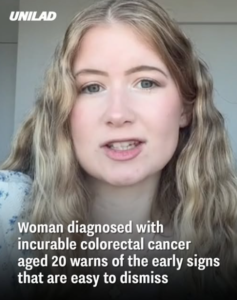Colorectal cancer, traditionally associated with older adults, is increasingly affecting younger individuals. Dominique McShain, a 20-year-old psychology student from New Zealand, was diagnosed with incurable colorectal cancer after experiencing symptoms like extreme fatigue, constipation, diarrhea, stomach pains, and loss of appetite. Initially given a prognosis of 1 to 5 years, recent tests revealed the cancer had spread to her lungs, reducing her expected lifespan to less than a year. Despite the devastating news, Dominique uses TikTok to share her journey, aiming to raise awareness about the increasing incidence of colorectal cancer among younger people. Her videos have garnered over 5 million views and massive support, with followers donating nearly $20,000 for her medical expenses. Dominique remains focused on helping others understand and catch the disease early.
Early Symptoms to Watch For
Recognizing early signs of colorectal cancer is crucial, especially for younger individuals. Common symptoms include:
-
Changes in Bowel Habits: Persistent diarrhea or constipation, or a change in the size or shape of stools.
-
Blood in Stool: Noticing blood in your stool or rectal bleeding.
-
Abdominal Discomfort: Persistent bloating, cramps, or gas.
-
Unexplained Weight Loss: Losing weight without trying.
-
Fatigue: Feeling unusually tired or weak.
If you experience any of these symptoms, it’s important to consult a healthcare professional for evaluation.
Increasing Incidence Among Young Adults
Recent studies indicate a concerning rise in colorectal cancer cases among young adults. Dr. Frank Frizelle, a colorectal surgeon, has observed an increase in early-onset cancer cases not just in New Zealand but also in Sweden and Scotland. Further global research supports this trend, revealing that young people worldwide are experiencing higher rates of various cancers. The increase is particularly striking for cancers of digestive organs, with young adults today being significantly more likely to develop colon and rectal cancers compared to those born around 1950.
Advocacy and Awareness
Individuals like Dominique McShain and Radwah Oda, who was diagnosed with stage 4 colon cancer at 33, are using their platforms to raise awareness about the importance of early detection and self-advocacy. Radwah shared her experience of dismissing early symptoms, such as changes in stool and unexplained pain, and emphasized the importance of consulting a doctor if you notice any concerning signs.
Conclusion
The rising incidence of colorectal cancer among younger individuals underscores the importance of being vigilant about health changes and seeking medical advice when necessary. Early detection can significantly improve outcomes, and sharing personal experiences can empower others to take proactive steps in their health.

